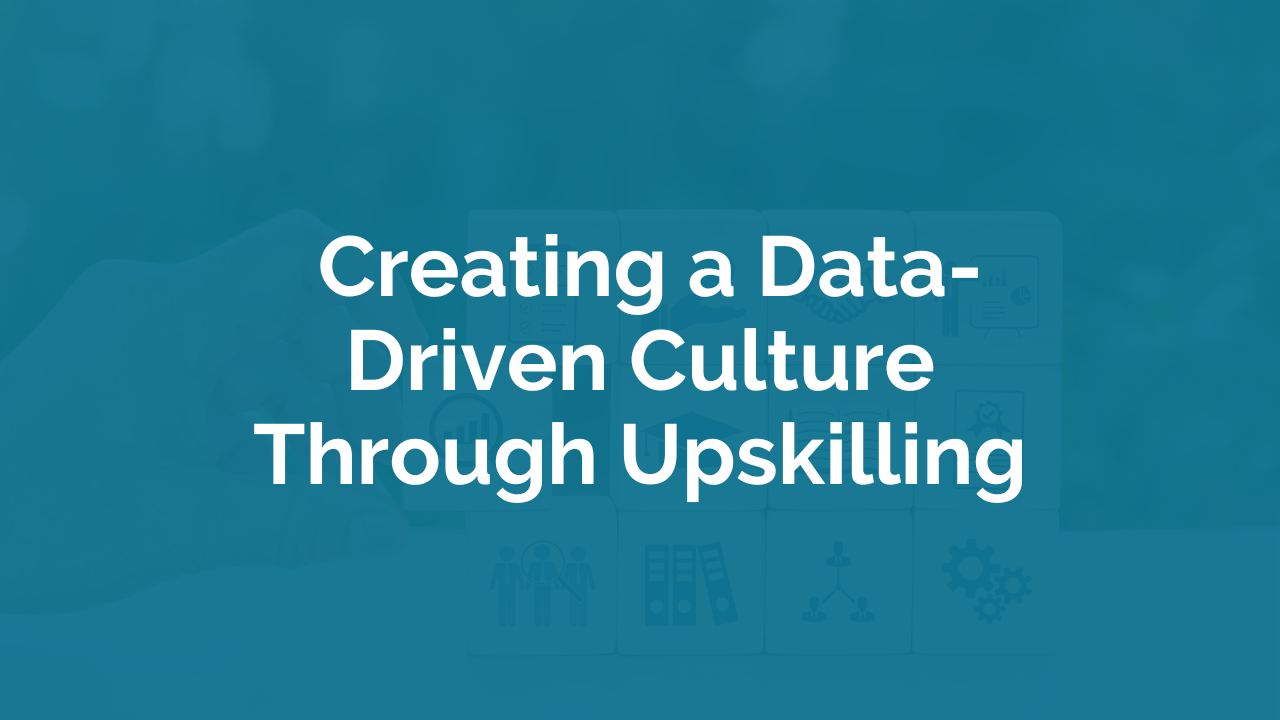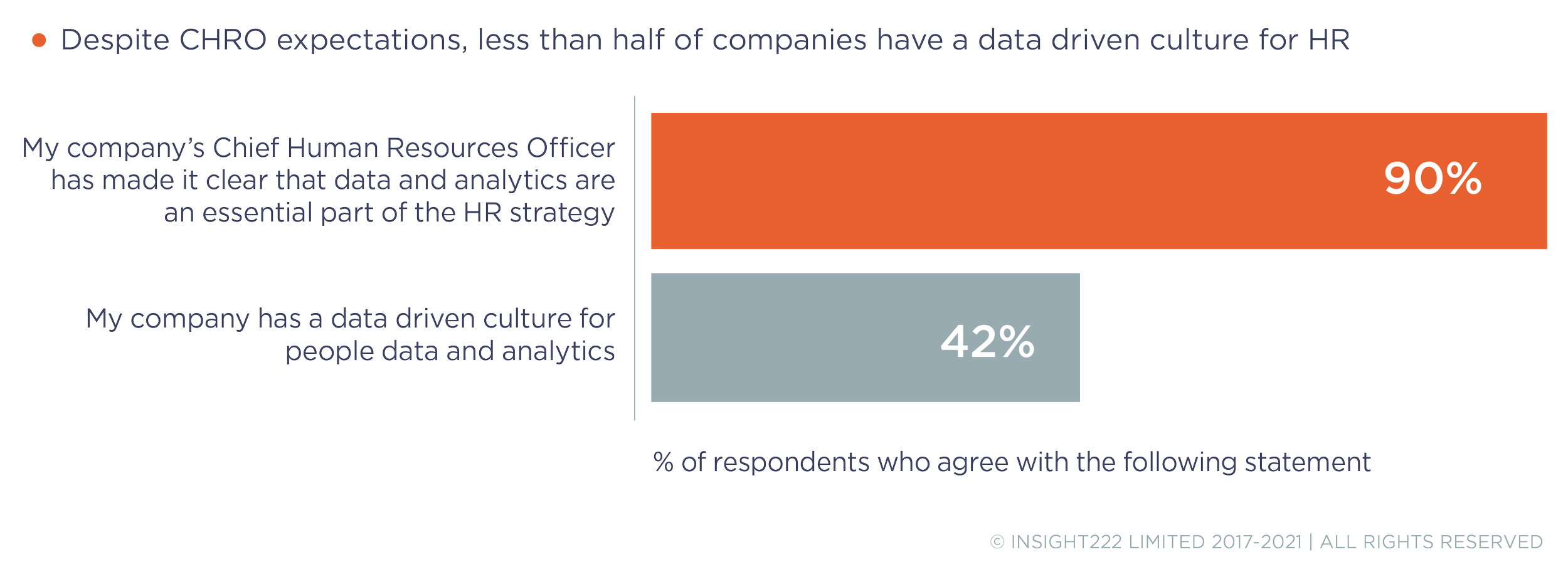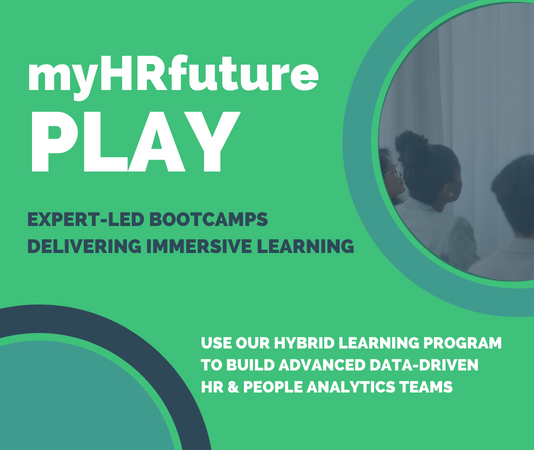Creating a Data-Driven Culture Through Upskilling
Leading Companies understand that in today's competitive marketplace, a data-driven culture derives value and growth for the organisation through strategic HR and People Analytics. For this to happen, HR professionals require the proper capabilities to lead their company through digital transformation and socio-economic turbulences. An immersive learning experience focusing on applying essential skills will help you go deeper and faster to equip your HR Teams with the capabilities they need to succeed in the modern workplace.
Why is Data-fluent HR Essential for Building a Data-driven Culture?
Insight222's People Analytics Trends 2022 report of 184 global organisations found that Leading Companies exhibit seven characteristics, enabling them to deliver more value with people analytics than non-leading companies. Leading Companies invest in their stakeholders and team, measure the financial impact of people analytics solutions and scale people analytics across the enterprise.
A key element of scaling people analytics across the enterprise in Leading Companies is that HR professionals–especially HR business partners–are developing their data literacy capabilities so that they can, for example, engage with key stakeholders to reveal insights with data, frame business questions, develop hypotheses, communicate the insights from people analytics work, and drive actions.
The findings supported Insight222's previous research in 2021 on the field, which identified three critical components in building a data-driven culture in HR. This included embedding data-driven decision-making across HR business partners and managers. In that same research, 90% of CHROs declared that they expected HRBPs to use people's data and analytics in their daily work, but only 42% of HRBPs stated that they were building their data literacy skills.
How to Accelerate HR Upskilling to be More Data-driven
At the end of 2021, we launched a new learning program with our Insight222 Learning line, myHRfuture, called PLAY. It was initiated to help HR professionals accelerate their upskilling plans and goals and create a more data-driven organisation that delivers value. We have been running the PLAY program with hundreds of HR professionals since then.
Due to the nature of the skills at stake, our experience of running different types of upskilling programmes has confirmed that participants most value the opportunity to practice their skills, learn from their peers and get immediate expert feedback.
Each cohort-based program gathers a mix of mid-level to senior HRBPs, talent experts, or other HR generalists. Ideally, a cohort will total 20-25 colleagues from different horizons and geographies. Their first step is to take a self-evaluation questionnaire to gauge better where they are in their development journey. Reports are personal, while an aggregated view of the group will be shared and commented on during a kick-off session.
The kick-off session is a synchronous moment to set the scene, define desired outcomes and start building the psychological safety that participants need on this learning journey that will average 8-12 weeks.
Following that kick-off, participants will have time to explore online content at their own pace. Still, gradually a more guided learning approach will be taken to signpost them to the essential knowledge they need to participate in the bootcamps.
These bootcamps are the main meaty parts of the program, and most of the time spent there is dedicated to a business simulation when participants will apply their skills.
The first learning segment, Bootcamp 1, will allow HR professionals to focus on analytical skills and data analysis. This includes business simulations, which are based on generic problem statements with realistic data related to a fictitious company.
They can practice in sub-groups, such as how to frame the business questions, build robust hypotheses and reveal the insights from data that will enable them to verify some of the hypotheses built around specific business questions.
The second section, Bootcamp 2, will require participants to apply some techniques in storytelling and visualisation to develop a pitch based on the root cause analysis they conducted in Bootcamp 1. This is usually when the magic happens. From the different sub-groups, they find can integrate knowledge, experience, and skills to demonstrate they are now able to:
Apply basic techniques and recognise best practices (and pitfalls) in people analytics and data-driven problem solving
Frame abstract business problems to turn them into clear hypotheses that can be verified (or not!)
Interpret HR analytics to reveal insights and interact in data-based conversations with business leaders
Show better confidence in dealing with various stakeholders at different seniority levels
Make convincing recommendations and use compelling storytelling to drive actions
Finding the Right Immersive Learning Strategy
There are important questions to ask yourself when looking for ways to build data-driven capabilities in your organisation. Immersive learning is an effective strategy that allows learners to engage in experiential and interactive learning activities, which can help improve learning outcomes.
However, finding the right immersive learning strategy can be challenging. To start, organisations should consider their specific learning goals and the learning needs of their teams.
Once the immersive learning strategy has been identified, strong executive sponsorship is critical for success. Immersive learning initiatives require resources; with executive sponsorship, securing the necessary resources and support may be easier.
Stakeholders should also be involved from the beginning to ensure that the immersive learning strategy aligns with the organisation's goals and objectives. Stakeholders can also help identify potential roadblocks and develop mitigation strategies to ensure the initiative's success.
Finally, continuous commitment from participants is necessary for success. Participants should be motivated to learn and engage to achieve their learning goals. Regular assessments and feedback keep participants engaged and motivated throughout the learning process.
In summary, finding the right immersive learning strategy requires careful consideration of the learning goals and needs of the organisation, strong executive sponsorship, stakeholder management, and continuous commitment from participants. With the right approach, immersive learning can be an effective strategy for building data-driven capabilities in organisations.
What Our PLAY Members Are Saying:
Good balance of online theory and virtual workshops. It's a real science and requires practice.
The break out in smaller groups is really nice! It gives a chance to everyone to participate.
It was very practical and insightful.
The method and dynamic of the session combined with the professional presenters the session results highly efficient and productive.
Thought I understood hypotheses, but when put into practice still need to think very carefully...
I enjoyed practical examples close to functional specifics.
I liked most working with the subgroup on the case study and the feedback provided by experts to the outcomes of our discussions
ABOUT THE AUTHOR
Cédric Borzée is a Learning Director at Insight222 where he leads the HR upskilling activities to build a data-driven culture in HR. Prior to joining Insight222, Cédric was a Senior Learning Strategist at Wiley/CrossKnowledge where he specialised in EdTech as a driver for business transformation and people performance. For the last 20 years, he has also hold various roles as HR Business Partner and HR Communications expert for the AXA Group and Hays Plc. Cédric has completed an Executive MBA at ESSEC Business School and an International Masterclass in L&D Leadership at Nyenrode/IE Business School.
Build a Data-driven Culture in HR With Learning and Change Management with myHRfuture PLAY
Our hybrid, cohort-based learning program supports HR professionals build advanced capabilities in data-driven skills. By combining digital learning with our interactive bootcamps we are able to provide you with an engaging experience that brings your learning to life. Our bootcamps provide you with practical case studies to explore and experiment with data in a safe environment that empowers you to turn theory into practice and apply your learning immediately on the job.





